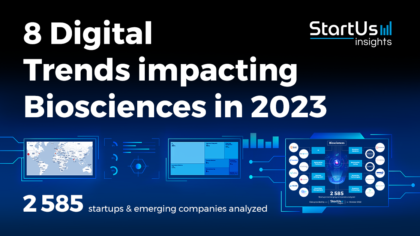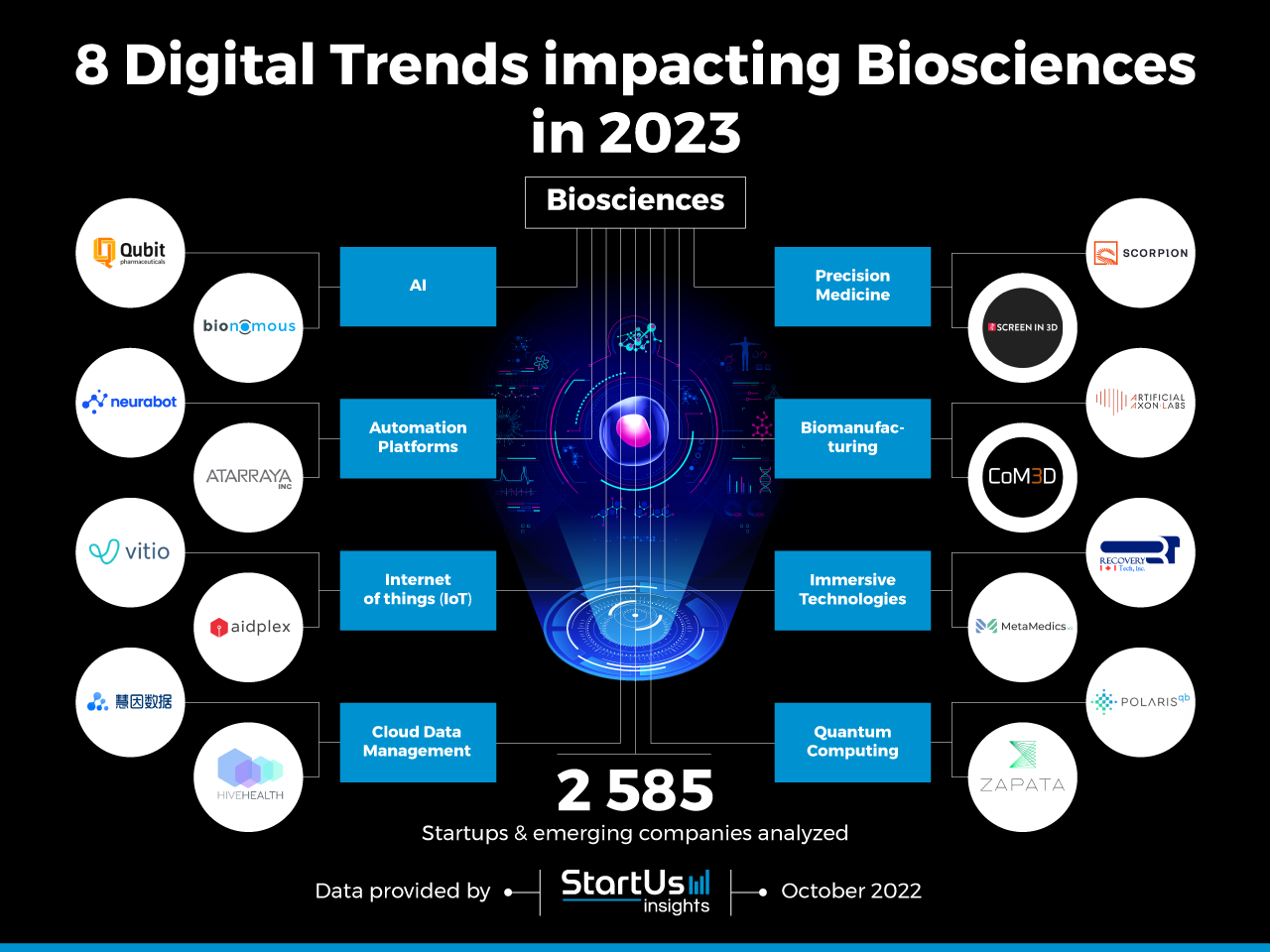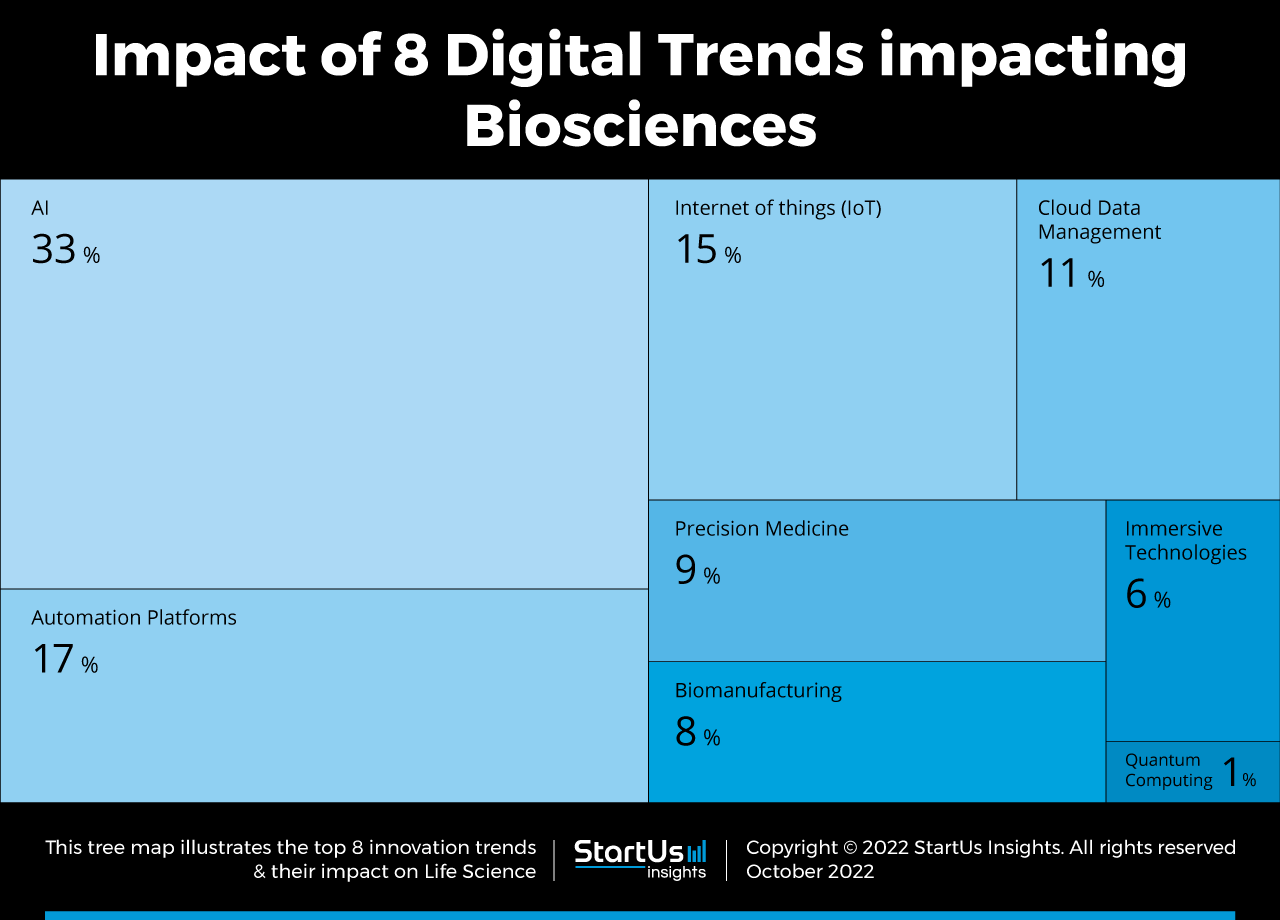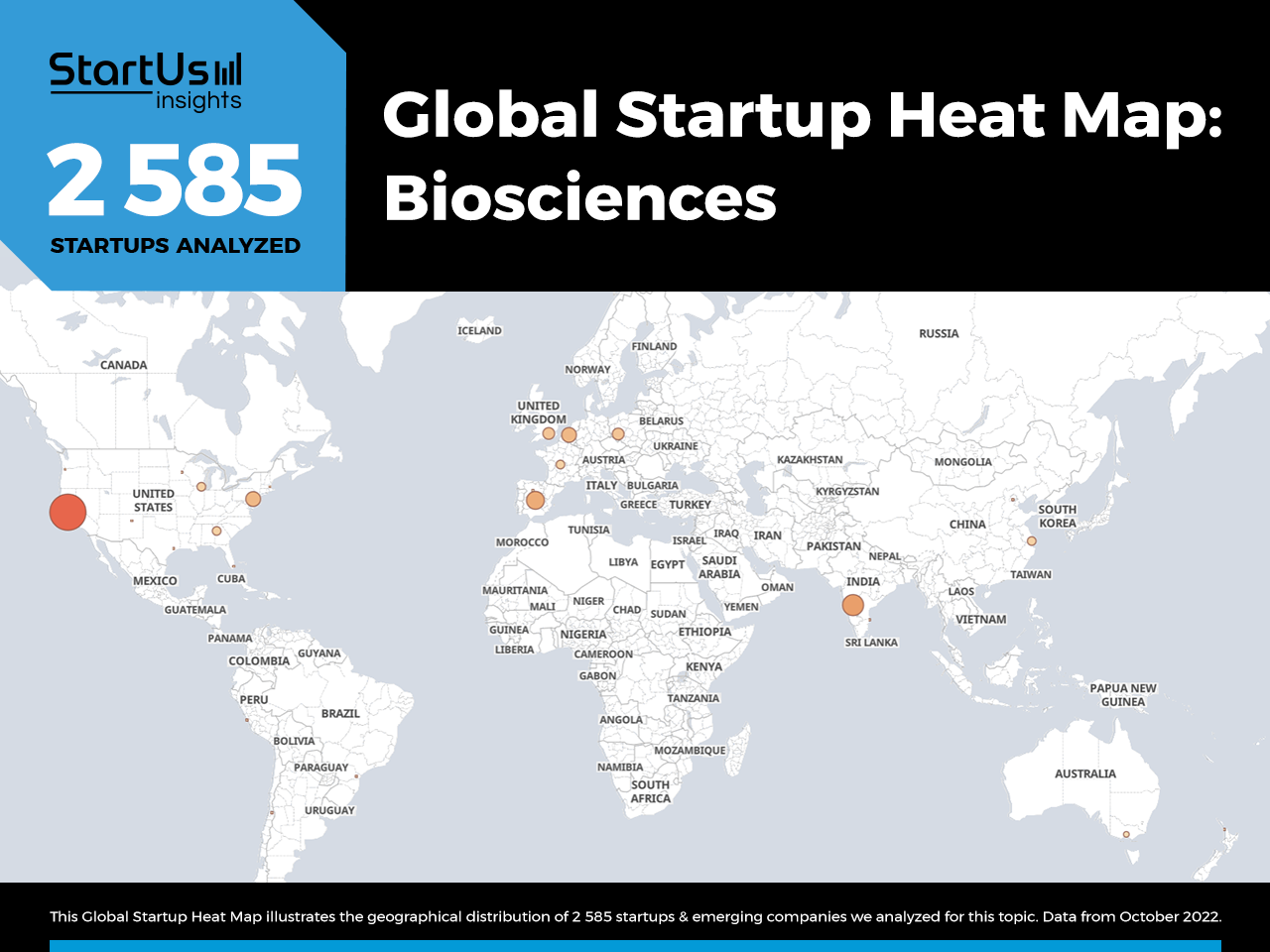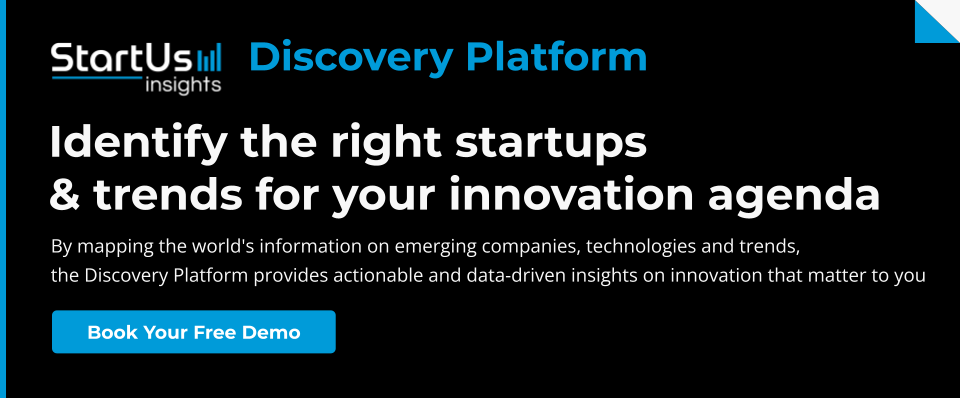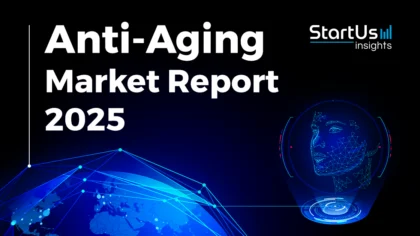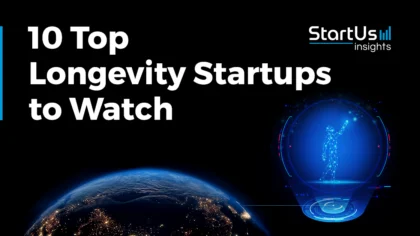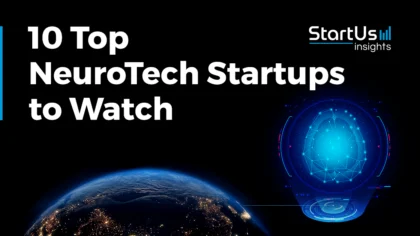Accelerate Productivity in 2025
Reignite Growth Despite the Global Slowdown
The major focus of digital trends in biosciences is on the improvement of health and well-being. However, the siloed legacy systems and lack of agile production methods in biosciences companies impact efficiency and productivity. Emerging digital trends in biosciences are upending this paradigm. This report provides an overview of the top digital trends in biosciences in 2023. Startups and scaleups are using digital solutions to enhance processes in pharmaceuticals, clinical research, medical devices, and other applications. Read more to explore how they impact your business.
Innovation Map outlines the Top 8 Digital Trends impacting Biosciences & 16 Promising Startups
For this in-depth research on the Top Digital Trends in Biosciences, we analyzed a sample of 2 585 global startups and scaleups. The result of this research is data-driven innovation intelligence that improves strategic decision-making by giving you an overview of emerging technologies & startups in the biosciences industry. These insights are derived by working with our Big Data & Artificial Intelligence-powered StartUs Insights Discovery Platform, covering 2 500 000+ startups & scaleups globally. As the world’s largest resource for data on emerging companies, the SaaS platform enables you to identify relevant startups, emerging technologies & future industry trends quickly & exhaustively.
In the Innovation Map below, you get an overview of the Top 8 Digital Trends in Biosciences that impact 2 585 companies worldwide. Moreover, the Biosciences Innovation Map reveals 16 hand-picked startups, all working on emerging technologies that advance their field.
Top 8 Digital Trends in Biosciences
- Artificial Intelligence
- Bioscience Automation
- Internet of Things
- Cloud Data Management
- Precision Medicine
- Biomanufacturing
- Immersive Technologies
- Quantum Computing
Tree Map reveals the Impact of the Top 8 Digital Trends impacting Biosciences
The Tree Map below illustrates the impact of the Top 8 Digital Trends impacting Biosciences in 2023. The startups and scaleups are leveraging innovations in agile production and R&D in biosciences. Startups are advancing AI and bioscience automation to make processes more efficient. Technologies like the Internet of Things (IoT) and biomanufacturing are making production more scalable. Further, technologies like cloud data management, immersive technologies, and quantum computing are enabling novel solutions in the industry.
Global Startup Heat Map covers 2 585 Biosciences Startups & Scaleups
The Global Startup Heat Map below highlights the global distribution of the 2 585 exemplary startups & scaleups that we analyzed for this research. Created through the StartUs Insights Discovery Platform, the Heat Map reveals that the US sees the most startup activity.
Below, you get to meet 16 out of these 2 585 promising startups & scaleups as well as the solutions they develop. These 16 startups are hand-picked based on criteria such as founding year, location, funding raised, and more. Depending on your specific needs, your top picks might look entirely different.
1. Artificial Intelligence
Artificial Intelligence (AI) is transforming the biosciences industry by using large sets of biological data and machine learning for a wide number of applications. These applications range from the integration of clinical records to identifying new classes of cell types. In the healthcare dimension of biosciences, companies use deep learning and computer vision for predictive diagnostics. On the other hand, pharmaceutical companies develop new drugs through AI-aided accelerated drug development. The use of AI further expands toward routine-based tasks in research laboratories and patient engagement.
Qubit Pharmaceuticals provides AI-enabled Drug Discovery
Qubit Pharmaceuticals is a French startup that provides AI-enabled drug discovery. The startup’s platform, Atlas, allows modeling and simulation of the interaction between molecules using AI. It enhances the quality of predictions and the interpretability of results. Pharmaceutical R&D companies leverage this technology for creating quick digital twins of the possible drugs which otherwise would take several years by conventional means.
Bionomous devises an Automated Egg Sorting Machine
Swiss startup Bionomous devises an automated egg sorting machine. The startup’s product EggSorter carries out a visual inspection, sorting, and dispensing of miniature biological entities such as eggs of zebrafish. It uses deep learning and algorithms to classify each egg and for determining continuous inspection status. This provides high precision and standardization of the egg sorting process. Various industries including aquaculture and diagnostic sectors utilize this technology for toxicology and genetic engineering research.
2. Bioscience Automation
Most biosciences operations involve a myriad of repetitive tasks and processes that are being disrupted by automation technologies. For example, automated data collection and collation are speeding up clinical trials, regulatory updates, and reporting. Applications of bioscience automation range from fermentation to livestock monitoring. All kinds of biosciences companies leverage automation for providing flexible capacity on demand.
Neurabot Lab offers a Digital Laboratory
Indonesian startup Neurabot Lab creates a digital laboratory platform. The platform digitizes medical images and analyses them. It allows researchers to collaborate and store lab data. Moreover, the platform saves time and money by analyzing laboratory needs. The platform modernizes legacy processes and drives automation in the bioscience industry.
Atarraya offers Automated Shrimp Production
US-based startup Atarraya offers automated shrimp production. The startup’s product, Shrimpbox mimics an ideal breeding environment for shrimps while also managing the complexity of the microbial community. This allows consistency of cultivation and enables remote water quality, temperature, and oxygen monitoring. The farming and aquaculture industry leverages this technology for automated shrimp production in countries with high labor costs.
3. Internet of Things
Bioscience companies use IoT to collect, analyze, and transmit data between devices. This finds a range of use cases in different contexts. For example, it allows primary care providers and hospitals to obtain real-time information on patients and their vitals. IoT also finds applications in supply chain optimization, improving profitability.
Vitio Medical manufactures Smart Thermometer Bracelets
Spanish startup Vitio Medical manufactures smart thermometer bracelets. The startup’s medical device detects and analyzes punctual or sustained fevers over time. It also detects infections and possible complications at an early stage. The startup also provides customizable telemonitoring software to integrate with this medical device. Medical companies and hospitals leverage this technology for monitoring the evolution and efficacy of the treatment.
AidPlex offers a Back Brace Wearable Device
Greek startup AidPlex offers back brace wearable devices for scoliosis. This wearable is a retrofit device that collects patients’ data and transmits them through Bluetooth to connected mobile phones. The gamified application of this startup provides rewards, achievements, and quizzes that give patients the ability to understand the importance of their treatment. This way, it provides regular and actionable insights into patients’ conditions.
4. Cloud Data Management
A significant driver of cloud adoption in biosciences is the ability to accommodate changing data requirements. Cloud computing is well-suited for demanding applications such as advanced modeling, simulation, and imaging. Another significant task of cloud computing in biosciences is to focus on drug discoveries. Cloud data management involves gathering and systematically storing, securing, and sometimes analyzing this data to provide actionable insights. Moreover, it enables remote access to health and regulation data thereby providing flexible infrastructure. Cybersecurity technologies empower cloud data management to accommodate all the demands of the biosciences industry without risking vital data.
Huiyin Data provides Gene Data Analysis
Chinese startup Huiyin Data builds a gene data analysis platform. The platform stores a sample’s genetic data to realize the entire life cycle from sampling and transportation to analysis and interpretation. As a result of such bioinformatics analysis, it completes database annotations within minutes. Clinical laboratories leverage this platform for genetic data visualization and phenotype-based scoring.
Hive Health offers a Healthcare Cybersecurity Platform
UK-based startup Hive Health develops a healthcare cybersecurity platform. The platform combines proprietary data sets and rules of a clinical pathway to understand operational dependencies. It also automates responses such as proactive segmentation in case of attacks on IoT devices. Governments and health institutions use this technology to reduce clinical risk and increase patient safety.
5. Precision Medicine
Precision medicine is an approach that considers the genetic information, environment, and lifestyle of each patient to develop strategies for disease treatment and prevention. Biosciences organizations and patients are leveraging this technology to eliminate unnecessary diagnostic testing and therapies. They collect individual personal data from electronic health records, DNA sequencing, etc. to conduct an in-depth analysis for pathogenesis. As a result, precision medicine has also given rise to customized medical devices, patient-centric diagnosis, and in-house diagnostic equipment thereby providing connected services for patients. Moreover, veterinary diagnostic research is also moving towards this technology for livestock health diagnosis.
Scorpion Therapeutics facilitates Precision Oncology
US-based startup Scorpion Therapeutics facilitates a precision oncology platform. The platform enables the startup to draw insights from their proprietary biological and chemistry datasets. They use these insights to develop precision therapeutic drugs for the treatment of cancer. Drug developing companies benefit from the toxicity and targeting approach of this technology.
ScreenIn3D produces a Microfluidic Platform
ScreenIn3D is a British startup that produces a microfluidic platform. The startup’s proprietary ONCO-Chip 3D technology enables the injection of tumor cells into the microfluidic platform which grows. The software develops 3D cell models of these cells and analyzes them. Drug screening laboratories and companies use this technology for drug discovery and efficacy for precision medicine.
6. Biomanufacturing
A major challenge for the biosciences industry has been agility in the manufacturing of specialized or customized products. Rapid manufacturing or prototyping technology uses software automation to tackle this issue. For example, pharmaceutical companies use 3d printing for customizing the release profile of the drug. Moreover, hospitals can produce on-demand patient-specific drugs without waiting for stock replenishment. Tailored medical devices such as vaccines or medical scaffolds are equally significant. Additive manufacturing enables the inclusion of active agents on these devices that are then remotely activated. Some biosciences companies are also exploring artificial organ production through rapid manufacturing.
CoM3D advances Continuous Drug Manufacturing
UK-based startup CoM3D builds a continuous drug manufacturing technology. The startup’s proprietary process includes converting poorly water-soluble drugs into soluble drugs through solid dispersion and co-crystals techniques. Pharma manufacturing units use the startup’s hot melt extrusion process and 3d printing to produce these soluble drugs continuously to achieve high volume.
Artificial Axon Labs manufacture 3D-printed Axon Mimics
US-based startup Artificial Axon Labs manufacture 3D-printed axon mimics using light. The 3D printing technology of the startup allows sub-micrometer features of the axons with ultra-low stiffness using biocompatible materials. Researchers and pharmaceuticals use these axon cells to develop remyelination drugs majorly focusing on multiple sclerosis.
7. Immersive Technologies
By adopting immersive technologies like virtual reality (VR), biosciences companies simulate multiple “what if” scenarios. This minimizes leakage in different processes within companies. On the other hand, augmented reality (AR) provides digital assistance and training. For example in the wellness sector, AR shows the users what they might look like if they followed a particular diet or incorporated certain lifestyle changes. Startups are also creating hyperrealistic experiences to further leverage the potential of immersive solutions.
Recovery Tech designs VR-based Rehabilitation
Candian startup Recovery Tech designs VR-based rehabilitation games. The game consists of different stages involving grabbing and throwing balls of different colors that show up on the monitor. The difficulty of the game help in increasing the range of motion in the shoulder, elbow, and wrist joints. Physiotherapists leverage this game to provide upper extremity rehabilitation to post-stroke patients.
MetaMedicsVR facilitates VR-based Surgical Training
Spanish startup MetaMedicsVR facilitates VR-based surgical training. The startup’s VR Laparoscopic simulator provides a data-driven evaluation system for laparoscopic procedure training. The software is compatible with all VR headsets and is customizable. Medical colleges and hospitals provide such VR-based training to students and doctors to face various surgical cases.
8. Quantum Computing
The major challenges in the biosciences industry today include understanding the sequences, structures, and functions of biomolecules. These problems are computationally complex. Quantum computing is accelerating research that advances sequence analyses and predictions. Quantum computing is improving drug discovery and protein folding predictions. Startups are also using quantum technology to simplify pharma supply chains.
Polaris Quantum Biotech develops Drug Discovery Platform
US-based startup Polaris Quantum Biotech develops a drug discovery platform using quantum computing. The platform allows the startup to scan billions of molecules from a large chemical space without the need for multiple optimization cycles. The use of quantum computing keeps the scanning process cost-efficient. Pharmaceutical companies use this technology to find better molecules in lesser time by running multiple concurrent drug discovery projects.
ZAPATA COMPUTING provides Quantum-based Resource Allocation Software
US-based startup ZAPATA COMPUTING provides quantum-based optimal resource allocation in the healthcare industry. With the help of machine learning, the software augments the data set of hospital resources. As a result, it enables patient treatment matching and priority scheduling of doctors and therapies. Hospitals and researchers utilize this technology additionally for generative modeling for clinical trial data and imaging data analysis.
Discover all Digital Trends in Biosciences
The growth of biosciences relies heavily on data and digitization. The push toward better tools to analyze and manipulate biological data are opening up new applications in the industry. Companies are also moving towards adaptive manufacturing practices, especially for vaccine production, to achieve flexibility and agility.
The Digital Trends in Biosciences outlined in this report only scratch the surface of trends that we identified during our data-driven innovation and startup scouting process. Among others, interoperable data sharing, deep learning, and ambient technologies will transform the sector as we know it today. Identifying new opportunities and emerging technologies to implement into your business goes a long way in gaining a competitive advantage. Get in touch to easily and exhaustively scout startups, technologies & trends that matter to you!
